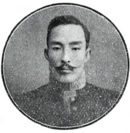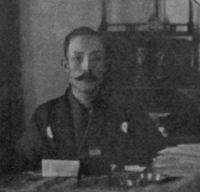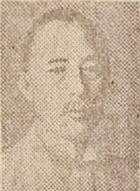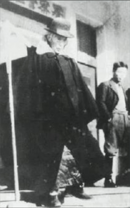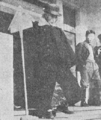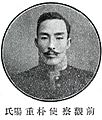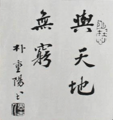Bak Jungyang facts for kids
Quick facts for kids
Bak Jungyang
|
|
|---|---|
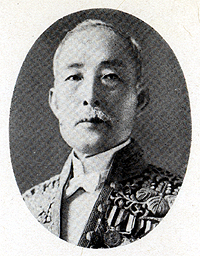 |
|
| Privy Councillor for the Governor-General of Korea | |
| In office 1927–1939 |
|
| Governor-General | Ugaki Kazushige Yamanashi Hanzō Saitō Makoto Jirō Minami |
| Governor of Hwanghae Province | |
| In office 1928–1928 |
|
| Governor-General | Yamanashi Hanzō |
| In office 1921–1923 |
|
| Governor-General | Saitō Makoto |
| Governor of North Chungcheong Province | |
| In office 1923–1925 |
|
| Governor-General | Saitō Makoto |
| Personal details | |
| Born | May 4, 1872 Junae-Myeon, Yangju, Gyeonggi Province |
| Died | April 23, 1959 (aged 86) Chimsan-dong, Daegu |
| Children | Bak Mun-wung, Bak Mu-wung, Bak Jeong-ja |
| Korean name | |
| Hangul | |
|---|---|
| Hanja | |
| Revised Romanization | Bak Jungyang |
| McCune–Reischauer | Pak Chungyang |
| Art name | |
| Hangul |
해악 or 일소
|
| Hanja | |
| Revised Romanization | Haeak or Ilso |
| McCune–Reischauer | Hae'ak or Ilso |
| Courtesy name | |
| Hangul |
원근
|
| Hanja | |
| Revised Romanization | Wongeun |
| McCune–Reischauer | Wŏngŭn |
| Japanese name | |
|---|---|
| Hochu Segeyo | |
| Kanji | 朴忠重陽 |
| Yamamoto Shin | |
| Kanji | 山本信 |
Bak Jungyang (Korean: 박중양, Hanja: 朴重陽; May 3, 1874 or 1872 — April 23, 1959) was an important Korean government official and politician. He lived during the late Joseon Dynasty and the period when Japan ruled Korea. He was known for his work in city planning and road building in Daegu, where he helped modernize the city. He also supported the Japanese rule in Korea.
Bak Jungyang studied in Japan before becoming a government official in Korea. He served as the Mayor of Daegu and later as a governor in several provinces, including Phyeongannamto, Jeollanam-do, and Chungcheongnam-do. He was involved in the Japan–Korea Treaty of 1910, which led to Japan's annexation of Korea. He also opposed the March 1st Movement, a large protest for Korean independence.
He was nicknamed Haeak (해악), Ilso (일소), and Wongeun (원근). He also had the Japanese names Shigeyō Hōchū (Japanese: 朴忠重陽) and Shin Yamamoto (山本 信).
Contents
Early Life
Bak Jungyang was born on May 3, 1872 or 1874, in Junae, Yangju county, Gyeonggi province. His father was Bak Jeong-ho. As a young man, he joined the Independence Club, a group that wanted to reform the Korean government. However, the club was stopped by the Korean Empire, which disappointed Bak.
Studying in Japan
Bak Jungyang wanted to study abroad in Japan from a young age. In 1897, he was chosen as a Korean student to study there. He supported himself because his family was not wealthy. From 1897 to 1900, he attended Aoyama middle school. In 1900, he went to Dokyo buki high school to study banking and also Japanese police studies. After finishing his studies, he adopted the Japanese name Yamamoto Shin. He also worked as a minor Japanese government official. He tried to bring a parliamentary system (where people elect representatives) to the Korean government, but it was not accepted. In 1903, he returned to Korea and became a civil officer. He continued to support a pro-Japanese viewpoint.
Career as a Government Official
Korean Empire Era

In 1903, Bak Jungyang held various government jobs. In 1905, he worked as a military interpreter during the Russo-Japanese War. He later became a staff member in the Farming, Commerce, and Industry Department. He resigned when the Japan–Korea Treaty of 1905 was signed, which gave Japan more control over Korea.
In 1906, Bak was promoted to Governor of Daegu County. Soon after, he became the Acting Governor of Gyeongsangbuk-do. During this time, he made a big decision: he tore down the castle of Daegueup without official permission. He secretly hired Japanese workers to do this. He also planned new streets for the city. The Korean government tried to punish him, but he was protected by Ito Hirobumi, a powerful Japanese politician. Bak later helped modernize Daegu's city planning and roads.
He also worked to build modern hospitals and medical schools, like the Dojin hospital. He believed in the importance of a free press, even for newspapers that made fun of him. He thought that a free press was necessary to keep an eye on the government. In 1907, he became governor of Phyeongannamto and Phyeonganpukto, and in 1910, the Governor of Chungcheongnam-do.
Japanese Rule
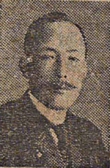
When the Japan–Korea Treaty of 1910 was signed, making Korea a part of Japan, Bak Jungyang remained as the Governor of Chungcheongnam-do until 1915. From 1916 to 1920, he was a member of the Japanese Government-General of Korea's Privy Council, which was an advisory group.
In 1919, he spoke out against the March 1st Movement, a major Korean independence protest. He even started a group called the Refrain club in response. Because of this, his old friends Seo Jae-pil and Yun Chi-ho stopped being friends with him.
He was appointed as the Governor of Hwanghae Province in 1921, and then Governor of North Chungcheong Province from 1923 to 1925. After the 1923 Great Kantō earthquake in Japan, he asked the Japanese government to release Koreans who had been arrested. He argued that Koreans were not involved in the crimes that happened during the earthquake. In 1928, he was again appointed as the Governor of Hwanghae Province.
Bak Jungyang managed the people through a system that used warnings and short periods of confinement instead of harsh punishments. He also tried to limit the power of Japanese police and soldiers who bothered civilians. Sometimes, government officials were put in jail, but the Japanese police never arrested Bak himself. This was because the Japanese Governor-General of Korea trusted him a lot, which made many Korean people happy.
World War II Era
From 1927 to 1939, he continued to be a member of the Japanese Government-General of Korea's Privy Council. In 1936, he became an advisor to the council. In 1940, he changed his name to Hōchū Segeyō as part of a Japanese policy called Sōshi-kaimei, which encouraged Koreans to adopt Japanese names.
During the Asia-Pacific War (part of World War II), he helped encourage and comfort Japanese troops. For example, in 1942 and 1943, he was sent to visit Japanese soldiers in Singapore. In 1943, he became Vice-Chairman of the Japanese Government-General of Korea's Privy Council. In 1945, he was elected as a congressman in the House of Peers, which was part of the Japanese parliament.
Because he cooperated with the Japanese Empire and the Japanese government in Korea, he was later listed as a collaborator after World War II.
Later Years
Korea gained its independence on August 15, 1945, after World War II ended. Bak Jungyang remained in Daegu. He sometimes made fun of Korean independence activists.
In 1949, he was arrested by a group called the Special Investigation Committee of Anti-National Activities. He was accused under a law for national traitors. However, Bak said he was innocent in court and stood by his pro-Japanese beliefs. In February 1949, he was released because he was sick with lung problems. He continued to criticize important Korean leaders like President Syngman Rhee. Bak Jungyang passed away in Daegu on April 23, 1959, from pneumonia.
Personal Life
Family
There was a rumor that he was the adopted son of Ito Hirobumi. However, in 1948, Bak Jungyang told a newspaper that this was not true. He called Ito Hirobumi "My respected teacher."
He had a wife, Lee Ju-yeol, and two sons. His first son, Bak Munung, also became a mayor in several areas of North Gyeongsang Province in the 1940s. His second son, Bak Mu-ung, died young.
His granddaughter, Bak Bu-nam (1931–2018), who was Bak Munung's daughter, became a doctor and a university professor. Her husband, Lee Yeol-hye, was also a doctor and a university professor.
Books
- 《Bak Jungyang's Diary》(박중양일기, 朴重陽日記)
- 《Sulhoe》(술회, 述懷)
- 《Sinnyeon sogam》(신년소감, 新年所感)
- 《Pokdosa pyeonjip jaryo》(폭도사편집자료, 暴徒史編輯資料) (1907)
Images for kids
See also
 In Spanish: Park Jung-yang para niños
In Spanish: Park Jung-yang para niños
- Korea under Japanese rule
- Ito Hirobumi
- Yun Chi-ho
- Seo Jae-pil
- Refrain club
- Yu Kil-chun
- Yun Chi-oh
- Russo-Japanese War
- Kim Ok-gyun
- Syngman Rhee
- Kim Ok-gyun
- Kim Kyu-sik
 | Bessie Coleman |
 | Spann Watson |
 | Jill E. Brown |
 | Sherman W. White |


